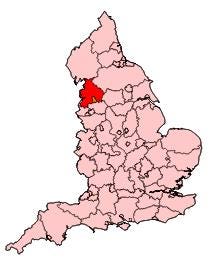Four Thousand Editors in Real Lancashire

A unifying theme of The Wikipedian in the first year of its existence -- and will be again now that its unscheduled hiatus comes to an end today -- has been the lag between the public's recognition of Wikipedia as an important if imperfect information resource and the public's understanding of how Wikipedia works.
Illustrating the point perfectly is a clumsy news item in a small UK newspaper, the Southport Visiter, highlighting local complaints in late February about a perceived error concerning the boundaries of Lancashire. According to the Visiter, the following text from Wikipedia (still present at this writing) is the matter of some dispute:
The county was subject to a significant boundary reform in 1974, which removed Liverpool and Manchester with most of their surrounding conurbations to form part of the metropolitan counties of Merseyside and Greater Manchester. Today the county borders Cumbria, Greater Manchester, Merseyside and North and West Yorkshire.
I say "some dispute" in part because I'm not quite clear on what the issue is. According to a group called the Friends of Real Lancashire, Wikipedia "leaves Southport off the ... map." But as far as I can tell, Wikipedia has already absorbed this perspective and includes the following sentence later in the article:
Pressure groups, including Friends of Real Lancashire and the Association of British Counties advocate the use of the historical boundaries of Lancashire for ceremonial and cultural purposes.
So it appears to me that Friends of Real Lancashire are unhappy with the representation of Lancashire's borders on Wikipedia, and have gone to the press with their concerns. This is not such a crazy idea: oftentimes ensuring placement of a particular fact or viewpoint in Wikipedia requires validation in a newspaper or magazine article before Wikipedia editors are likely to agree the fact or viewpoint is true or significant enough for inclusion. Because their viewpoint is presented, at least in summary, this must be a dispute over facts.
Now, let's say I am a Wikipedia editor who lives thousands of miles away from Lancashire and have no special knowledge of the area's boundaries (which is in fact the case). A newspaper article pointing out a supposed error could be useful to me. Perhaps I'm inclined to update the article based on what I have learned. Except the article does not explain the dispute carefully enough for me to make a judgment; the impression I am left with is that some people are unhappy with the designated boundary and wish for Wikipedia to elevate their views over existing reality. In which case I will ignore them as soon as I figure this out. Or maybe I write this blog post.
That Friends of Real Lancashire and the Southport Visiter have little idea how Wikipedia works is also quite evident:
[Friends of Real Lancashire] has contacted the website on several occasions, are concerned that those wanting to learn about Lancashire will be given the wrong information. ... Although comments and letters have been sent to the editor of Wikipedia, Mr Dawson said that no action has since been taken.
Letters to the editor? The editor? There is a fundamental disconnect here, one in fact so stark that one wonders whether Wikipedia's structures are so vanguard as to be incomprehensible to the average user, or whether the Real Lancashirites are hopelessly behind the times. It's one thing for people who don't think much about Wikipedia to misunderstand it; it is quite another for an organized interest group to care what Wikipedia says but not take the time to understand why it says what it does.
This phenomenon is bigger than Wikipedia. From where I live and work in Washington, DC, I often see advocacy organizations that are so focused on advancing their viewpoint using a manner and technique which is advantageous to them in one venue (newspapers, radio, television) that they cannot adjust their approach to advance their viewpoint in another (weblogs, social networks, Wikipedia). Sometimes, this adjustment undermines their original point, in which case they were destined to lose, anyway. This happens all the time.
So Friends of Real Lancashire may lose no matter what; if I am correctly interpreting their case, they will. Even so, it does not appear they have even tried to make their case in the proper manner. At least they have not engaged the one forum in which they might make their case directly to Wikipedia's contributors: the Talk page associated with the Lancashire article. It's there for a reason, and if you don't use it, those who do will probably have themselves a laugh at your expense and go right back to editing Wikipedia.
Lancashire map via Wikipedia.


